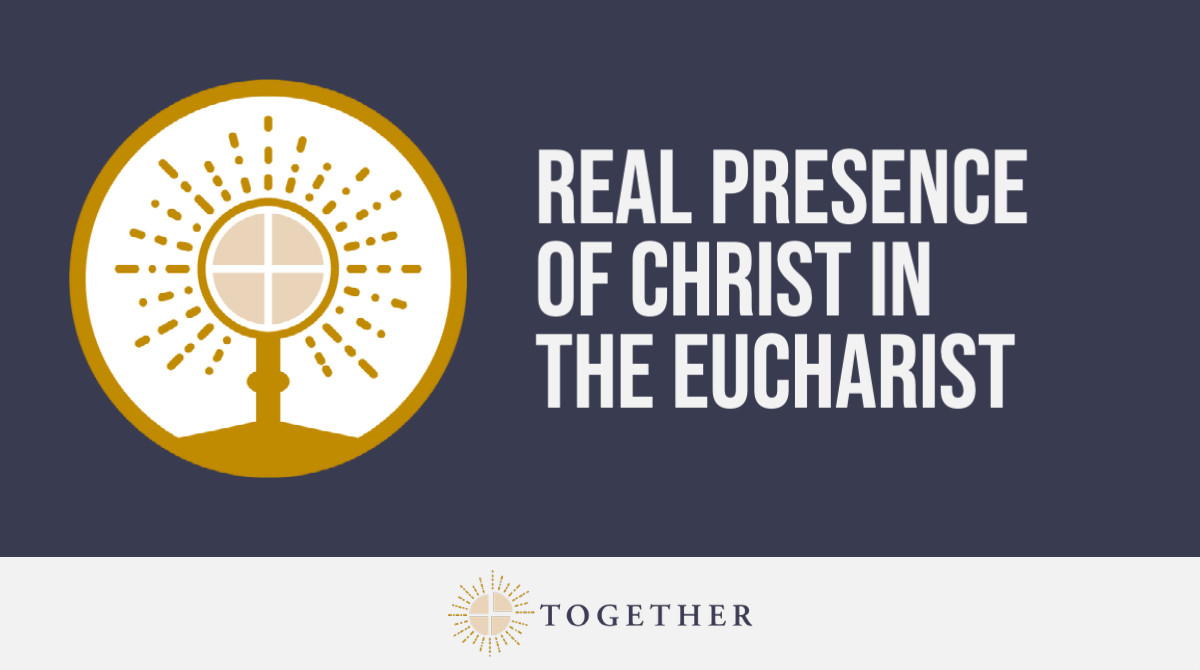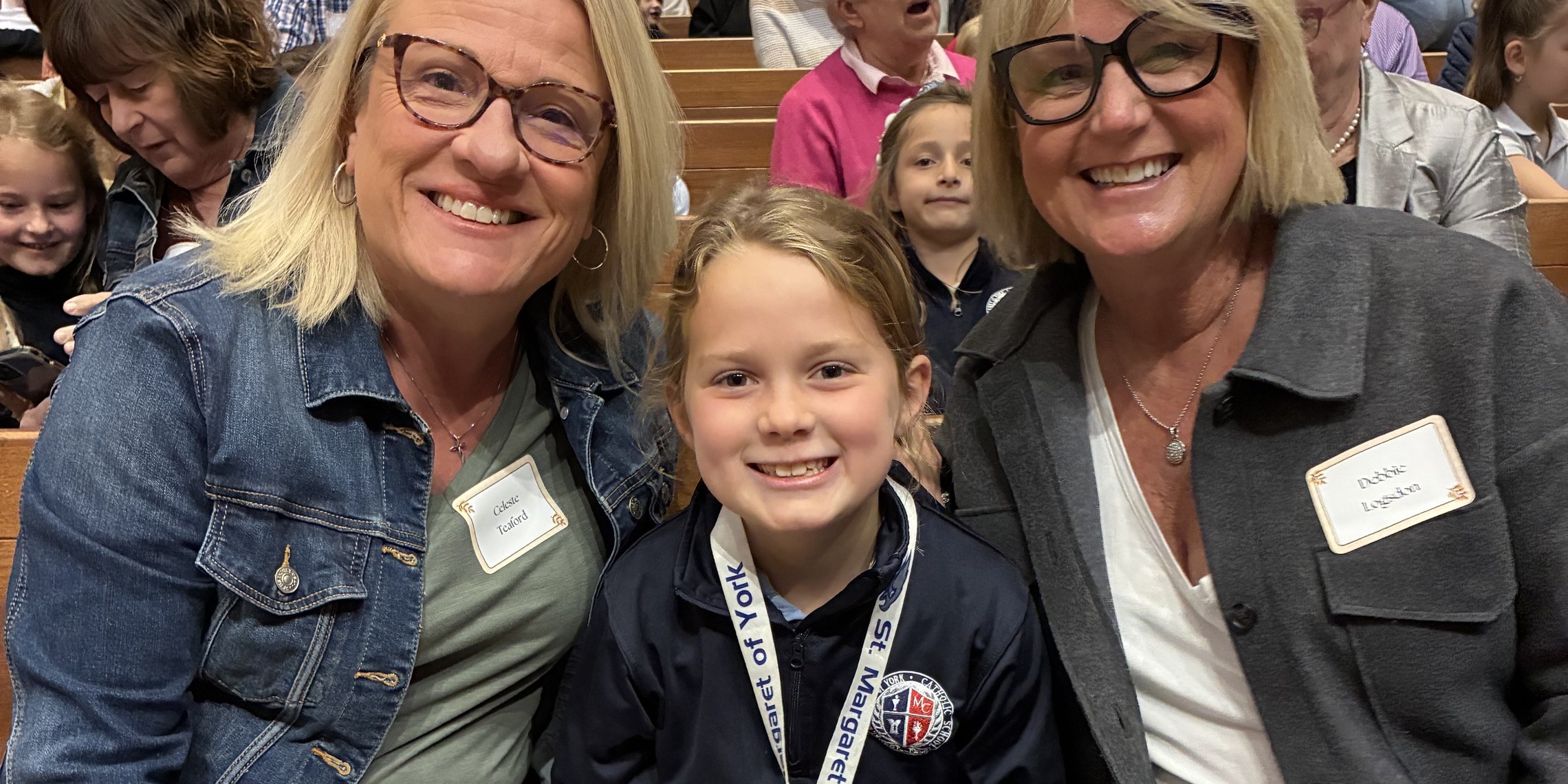June 2, 2021
Most of us remember from our childhood using this phrase in fun. However, this expression describes well our experience of Holy Communion. When we consume earthly food, it is absorbed into our system, digested, converted into energy or waste; our food becomes part of us. Yet when we receive Holy Communion, we become united with Jesus Christ so much that we truly become what we receive. Jesus became human so that we might become divine, and in the Eucharist, we truly gain a share in God’s own life.

Really and Truly Present
We believe that Jesus Christ – God’s own Son – is really and truly present in the consecrated bread and wine. But it also points beyond our earthly experience towards a union with Christ that is impossible to explain this side of heaven. All sacraments are outward signs of invisible grace, the working of God in our lives. This holy meal is truly a Communion with God.
Take and Drink
Catholics believe that we encounter God above all in sacramental signs. In Holy Communion, we share in God’s own life through the sacrament of Jesus’ own Body and Blood. Even though we receive the “whole Christ” – body, blood, soul, and divinity – when we receive Communion under the form of bread alone, receiving Communion also from the chalice is a more complete participation in the Eucharist. In the sign of consecrated wine, we see Jesus’ blood outpoured for us and are challenged to drink the common cup with our brothers and sisters in Christ.
How Christ is Present in the Mass
1) Christ is Present in the Word of God
“It is truly Christ who speaks when the holy scriptures are read in the Church,” teaches the Church. The relationship between God’s Word and the Eucharist has been strengthened by the development of a 3-year cycle of scripture readings to be used for Sunday Mass. The Introduction to the Lectionary for Mass, the books that contain the Mass scripture readings, sums it up in this way: “In the hearing of God’s word the Church is built up and grows…past works in the history of salvation are presented anew as mysterious realities.”
2) Christ is present in the Bread and Wine
We believe that through the power of the Holy Spirit and the prayer of the Church, bread and wine are changed into the Body and Blood of Christ. In the Liturgy of the Eucharist, the priest, praying with and for the people, makes the sacrifice of the cross real again by taking the bread and wine, asking God to bless it, then breaking the bread and sharing it. Just as the apostles ate and drank at the Last Supper, we all eat and drink to be nourished to continue Christ’s saving work in the world. The Eucharistic Prayer is the center and heart of the whole Mass, and in it, the Church gives thanks to God for saving us from sin and death.
3) Christ is Present in the priest
Among the many ways Christ is present at Mass is in the ministry of the ordained priest who leads the assembly in the celebration. Praying with and in the name of the community gathered, the priest acts in the person of Christ, the Head of the Church (in persona Christi capitis ecclesiae) in the celebration of the Eucharist. Each Mass is an action of the whole Church: included in every Eucharistic Prayer are prayers for the Church, for the pope, and for the local bishop. And, throughout the Eucharistic Prayer, the priest prays on behalf and as part of the community, in the plural person: “Let us give thanks…We come to you with praise and thanksgiving…” Through the deacon and other ministers, we encounter Jesus Christ who came to serve.
4) Christ is Present in the Church at Prayer
While Christ is truly present at Mass in the Word proclaimed, the Eucharistic bread and wine, and in the ministry of the priest, the Constitution on the Sacred Liturgy of Vatican II affirmed that Christ is present “when the Church prays and sings, for he promised: ‘Where two or three are gathered together in my name, there I am in the midst of them.’” Mass is not a “spectator sport”, in which the priest performs and the people merely watch. The celebration of the Mass - Word, and Eucharist - requires the participation of all the faithful because we are “a chosen race, a royal priesthood, a holy nation, God’s own people.” Through texts in the language of the people, music accessible to the assembly, and a fuller understanding of what we do, we are all called to engage fully each and every Sunday in this most holy liturgy
Things to think about
- Am I really present to the presence of Christ in the Eucharist?
- What keeps me from being truly and really present to God at Mass?
- Do I experience Jesus’ presence in the community, in the Word proclaimed, in the ministry of the priest and others? How can I better encounter Jesus in these ways?
- What are some ways I can be the presence of Christ to others?
This article is part of Together, an Archdiocese of Cincinnati initiative to catechize the faithful on the importance of Mass, the real presence of Christ in the Eucharist, the value of Sunday, our obligation to worship, and the advantage of being together physically rather than virtually.
This article is part of Together, an Archdiocese of Cincinnati initiative to catechize the faithful on the importance of Mass, the real presence of Christ in the Eucharist, the value of Sunday, our obligation to worship, and the advantage of being together physically rather than virtually.
More News...
Grandparents' Day
Grandparents’ Day at SMOY was a heartwarming and joyful celebration filled with love, laughter, and faith. The students attended Mass with their grandparents before...Read more
The Stories Behind the Gospels
Discover the Stories Behind the Gospels!
Join us for an engaging evening as we dive into two accounts of Jesus’ life—the Gospels of...Read more






